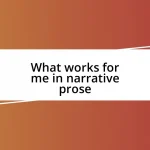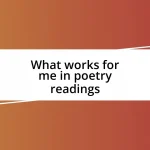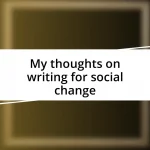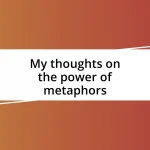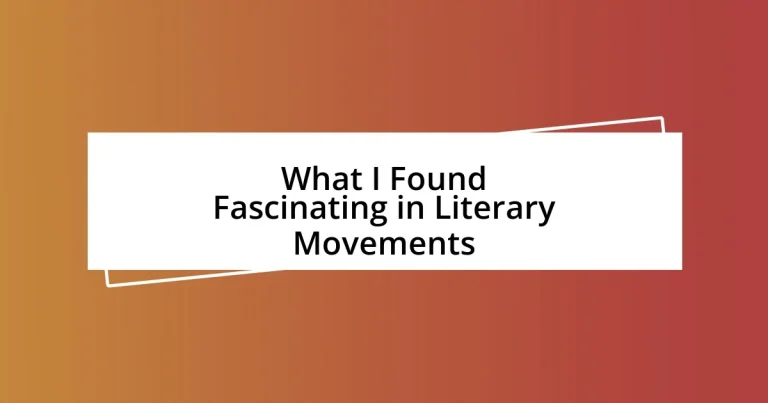Key takeaways:
- Literary movements reflect societal issues and evolve in response to historical contexts, highlighting themes of identity, nature, and existential challenges.
- Influential authors like Virginia Woolf, Langston Hughes, and George Orwell shaped literature with their innovative styles and poignant themes, resonating with contemporary readers.
- Literature serves as a catalyst for social change, with movements like feminism and postcolonialism amplifying diverse voices and challenging societal norms.
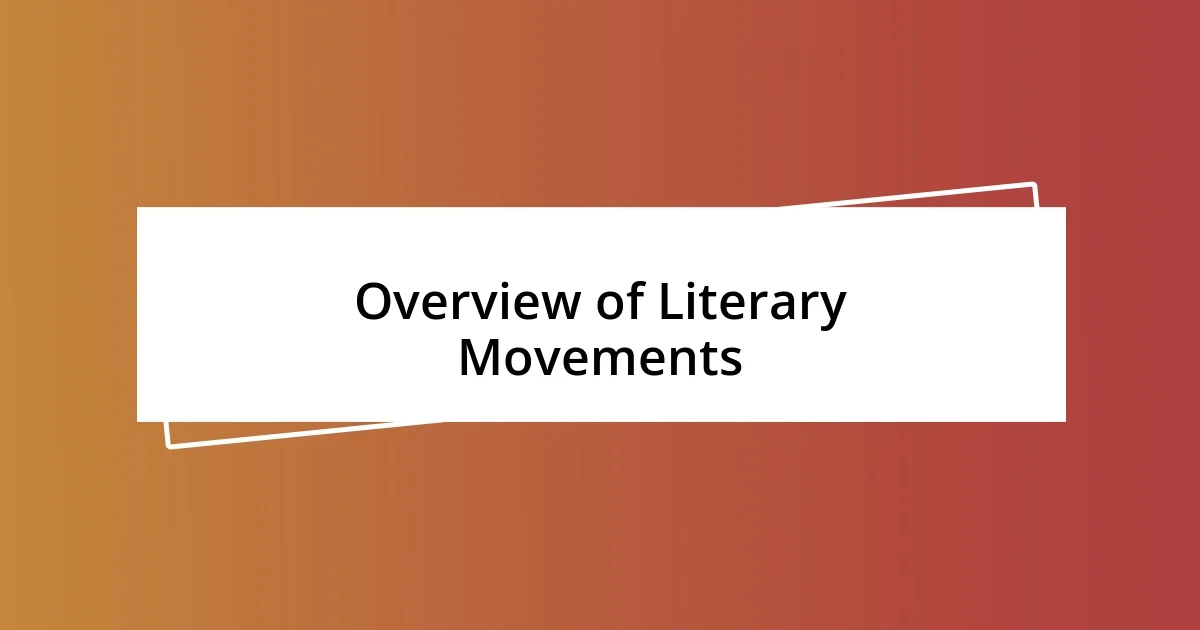
Overview of Literary Movements
Literary movements reflect the evolving nature of literature in response to historical, cultural, and social contexts. I often find myself captivated by how certain eras, like the Romantic period, emphasized individual emotion and nature as a reaction against the industrial revolution. Isn’t it fascinating to think about how writers like Wordsworth and Blake crafted their works in such a tumultuous time?
As I dive deeper into various movements, I notice how each one serves as a mirror to the issues of its time. For instance, the Modernist movement, with its fragmented narratives and stream-of-consciousness style, emerged in the wake of World War I, showcasing a profound sense of disillusionment. Reflecting on these shifts makes me wonder: how do today’s literary voices capture our current anxieties?
Exploring literary movements also brings a sense of connection to the past. When I read from the Harlem Renaissance, I feel the vibrant pulse of cultural awakening and the fight for identity. These movements aren’t just names in textbooks; they are living dialogues that continue to inspire contemporary writers and readers.
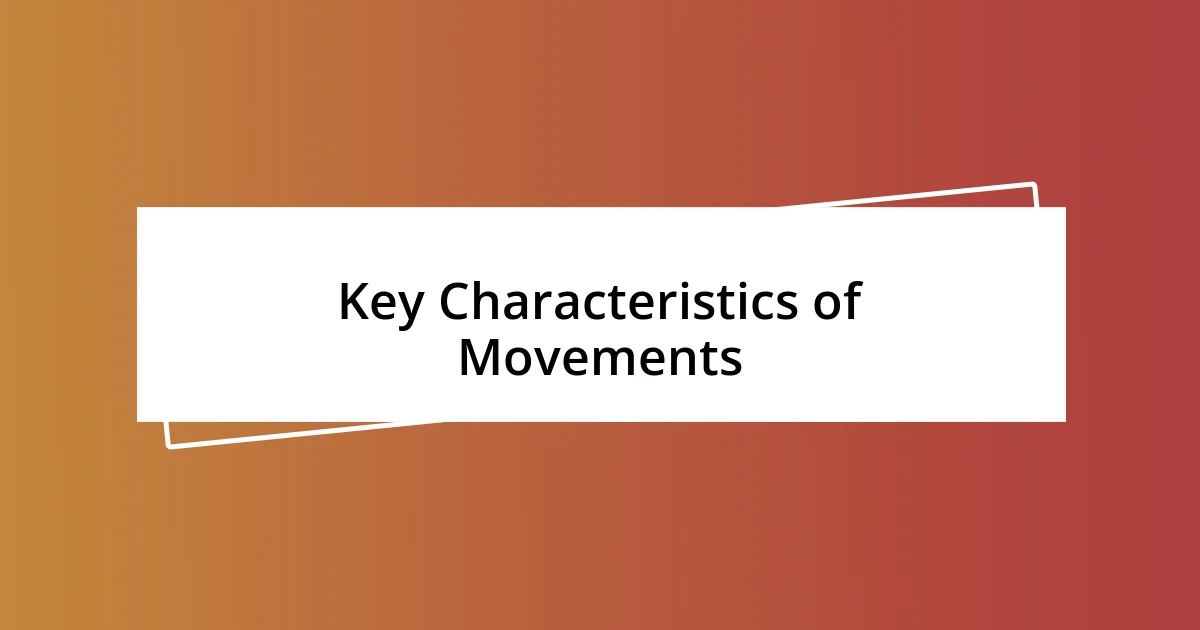
Key Characteristics of Movements
When I study the key characteristics of literary movements, I realize that they often stem from a collective voice responding to the zeitgeist of their time. Movements don’t just emerge; they thrive on the artistic and social currents shaping people’s lives. For example, the Beat Generation was marked by a rebellious spirit that sought to challenge conformity and celebrate spontaneity, which resonated deeply with my own quest for authenticity in writing.
Here’s a brief snapshot of essential characteristics commonly found across movements:
– Cultural Context: Each movement is rooted in specific historical and social circumstances.
– Thematic Focus: Movements often revolve around central themes, like identity, nature, or existential crises.
– Style and Form: Many movements feature distinct stylistic choices, such as surrealism’s dreamlike imagery or realism’s focus on the everyday.
– Collective Identity: Writers within a movement typically share common beliefs, forming a community that influences each other’s work.
– Reactions to Prevailing Norms: Movements often arise as a response to previous forms of literature or societal constraints, forging new paths of expression.
Understanding these characteristics not only enhances my appreciation for literature but also connects me emotionally to the struggles and triumphs of generations before me. What a rich tapestry of human experience we can unravel through these literary threads!
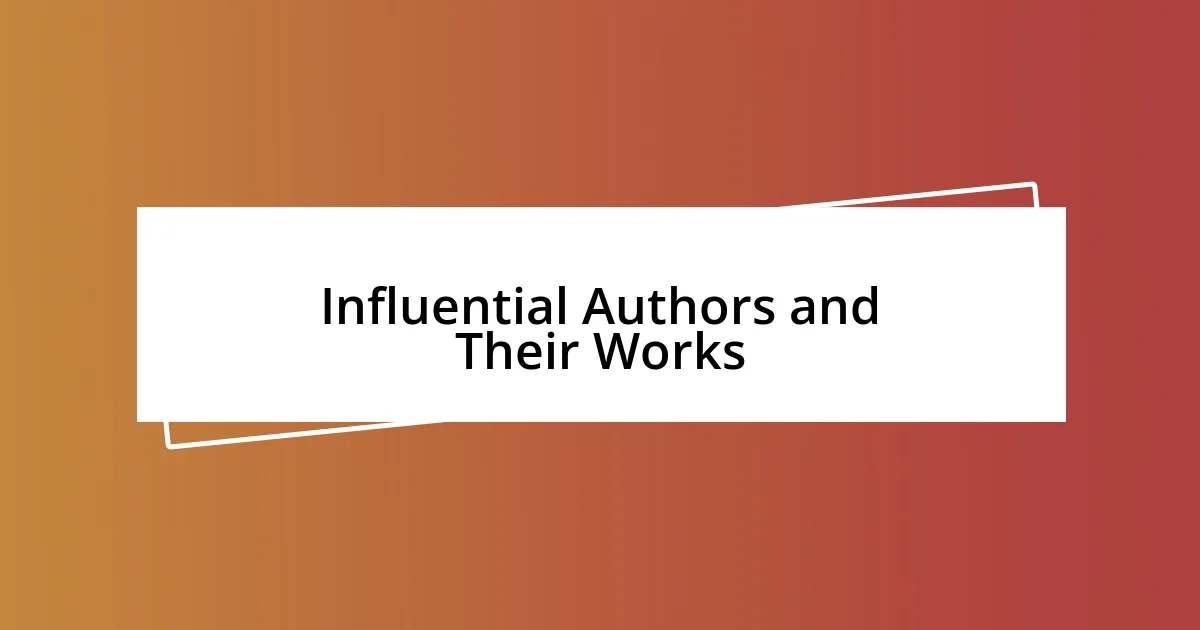
Influential Authors and Their Works
When I think about influential authors, a few names instantly come to mind. For example, Virginia Woolf’s innovative techniques in novels like Mrs. Dalloway and To the Lighthouse showcased how stream-of-consciousness can deeply explore human psyche and emotion. Reading her works felt like peering into my innermost thoughts, resonating with my own experiences of time and memory.
On the other hand, the raw honesty of Langston Hughes during the Harlem Renaissance embodied the struggles of African American identity. His poem The Negro Speaks of Rivers has a way of capturing the depths of legacy and resilience that I find incredibly moving. It urges me to reflect on how our histories shape who we are.
Lastly, I can’t overlook George Orwell’s pivotal works such as 1984 and Animal Farm. His profound warnings about totalitarianism and manipulation of truth are alarmingly relevant today. These stories invoke a sense of urgency in me to stay vigilant against the forces that seek to undermine our freedoms.
| Author | Influential Work |
|---|---|
| Virginia Woolf | Mrs. Dalloway |
| Langston Hughes | The Negro Speaks of Rivers |
| George Orwell | 1984 |
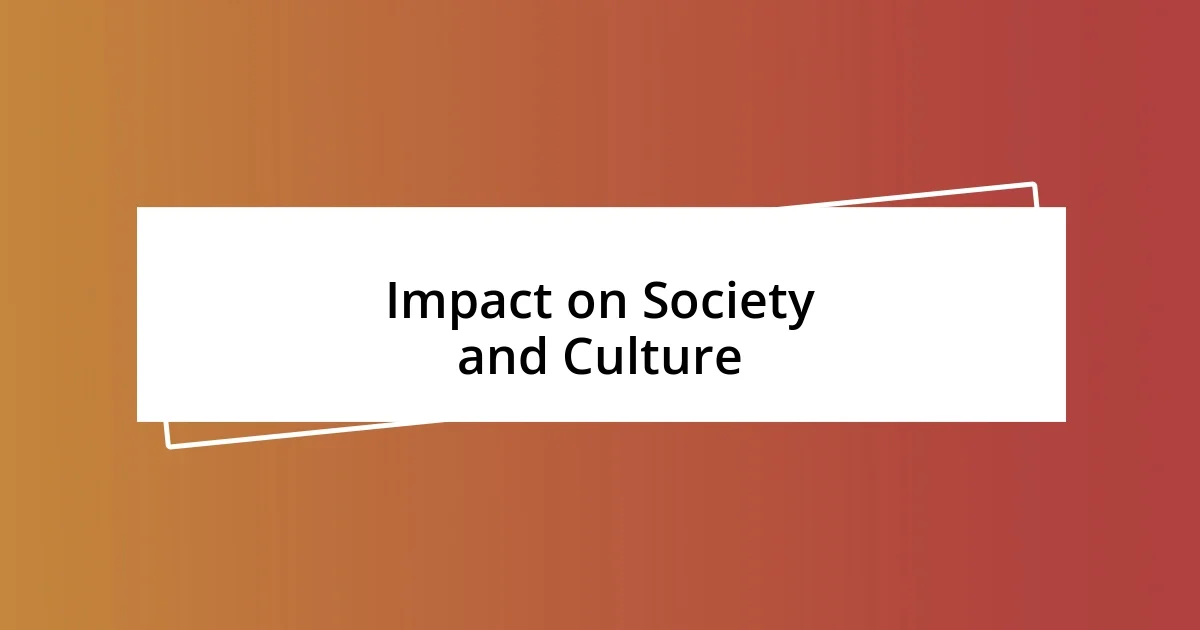
Impact on Society and Culture
Examining the impact of literary movements on society and culture reveals a powerful interplay between written expression and social change. For instance, during the feminist movement, the works of authors like Simone de Beauvoir and Mary Wollstonecraft sparked conversations about gender equality that still resonate today. I often wonder how literature can serve as a catalyst for change, pushing societal norms forward while challenging long-held beliefs.
In my own life, I’ve witnessed how the portrayals of marginalized communities in contemporary literature have fostered greater empathy and understanding. It’s a reminder that storytelling can bridge divides. When I read authors from diverse backgrounds, like Chimamanda Ngozi Adichie, I find myself not only learning about different cultures but also reflecting on my own prejudices. Isn’t it fascinating how a well-crafted narrative can invite us to see the world through someone else’s eyes?
Moreover, I feel that literary movements often mirror the frustrations or aspirations of their times, giving voice to collective experiences. The emergence of postcolonial literature, for example, highlights the struggles of many nations reclaiming identity in the wake of colonialism. Diving into these narratives has enriched my understanding of history and its ongoing impact on our current cultural landscape. Isn’t it inspiring how words can mobilize a community and shape the trajectory of societies?
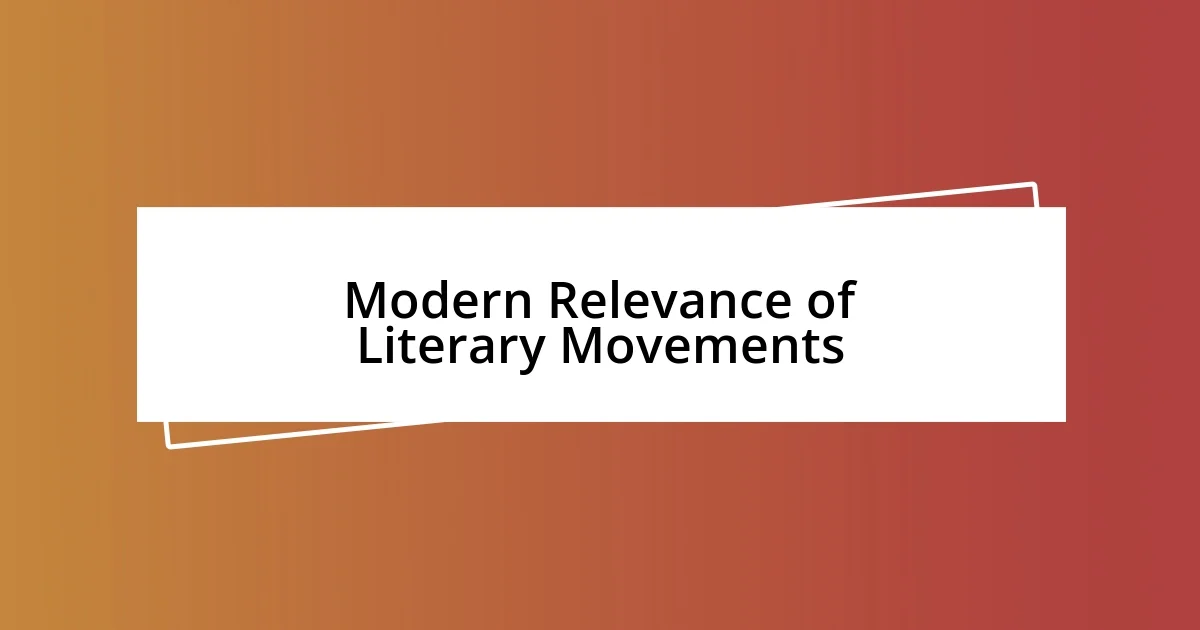
Modern Relevance of Literary Movements
Literary movements, even from decades or centuries ago, still resonate in our modern world. I often think about how the themes of existentialism explored by authors like Jean-Paul Sartre connect with today’s struggles for meaning in a fast-paced digital age. It feels as though his questions about existence mirror my own moments of self-doubt and introspection during challenging times, reminding me that grappling with life’s purpose is a timeless endeavor.
Looking at the impact of the Beat Generation, I see not only a rebellion against societal norms but also a search for authentic self-expression that continues to inspire contemporary artists. Whenever I dive into Jack Kerouac’s On the Road, I feel a rush of wanderlust and the urge to break free from convention. This resonates so deeply in a world where so many people long for genuine connections and experiences. Don’t you think it’s fascinating how a book can stir such strong emotions and compel us to seek adventure?
The environmental movement, too, finds its roots in literature; works from the eco-critical literary movement highlight our fragile relationship with nature. I remember feeling a profound sorrow after reading Silent Spring by Rachel Carson. It struck a chord in me, awakening my awareness of environmental issues. How powerful it is that literature not only reflects our world but can also urge us toward change. In this way, I believe literary movements are not just artifacts of the past; they’re vibrant and vital discussions that shape our future.
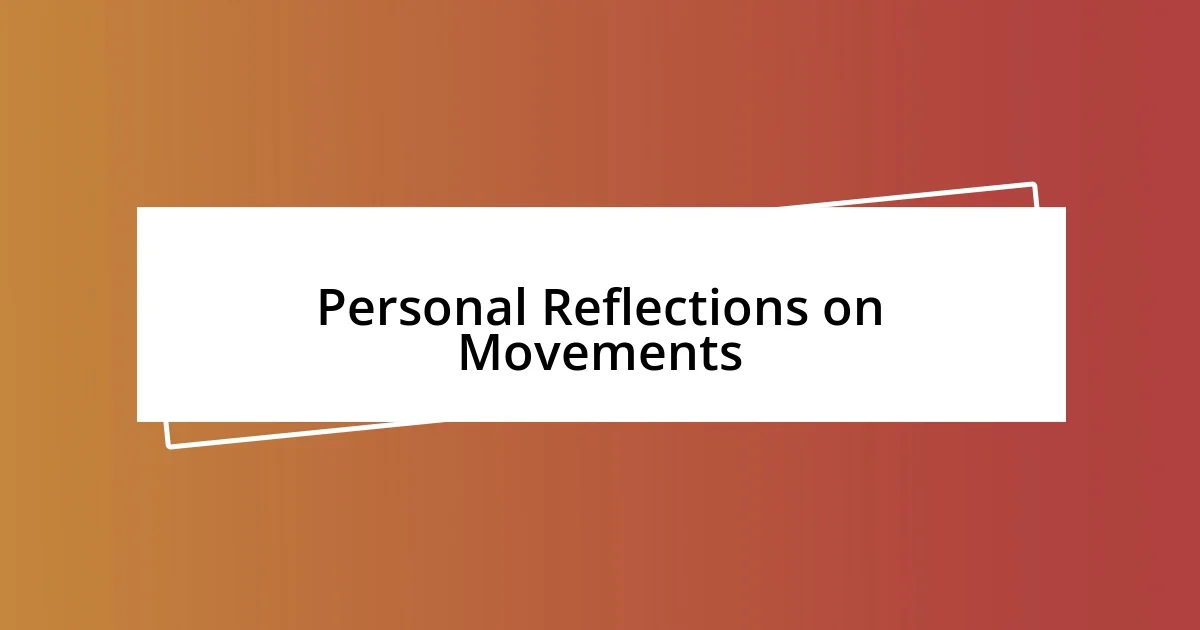
Personal Reflections on Movements
Reflecting on literary movements, I often find myself contemplating how the Romantic era’s emphasis on emotion and nature resonates with my own experiences. I distinctly remember sitting under a sprawling tree during a quiet afternoon, immersing myself in Wordsworth’s poetry. The way he captures the beauty of the natural world spoke to my soul, reminding me that it’s essential to pause and appreciate the simple wonders around us. Have you ever felt that connection between your personal experiences and the words of a poet from centuries ago?
There’s something deeply moving about how the Harlem Renaissance brought a surge of creativity that empowered Black voices. I recall the first time I read Langston Hughes; his words seemed to vibrate with a raw energy that reflected both joy and pain. That contrast in emotion inspired me to consider my own creative expressions and struggles. Can literature truly capture the complexities of the human experience? I believe it can, often revealing hidden layers of our own realities and providing a pathway to understanding.
As I reflect on the Surrealist movement, I can’t help but think about how it invites us to explore the bizarre and the unconscious. I remember attending an exhibition that featured works by Salvador Dalí; the dreamlike imagery challenged my perceptions of reality. It struck me how literature, too, can transcend ordinary experiences and plunge us into realms of the unexpected. Isn’t it exhilarating to think about how stories can unravel the fabric of our everyday lives and unveil a world filled with possibilities?
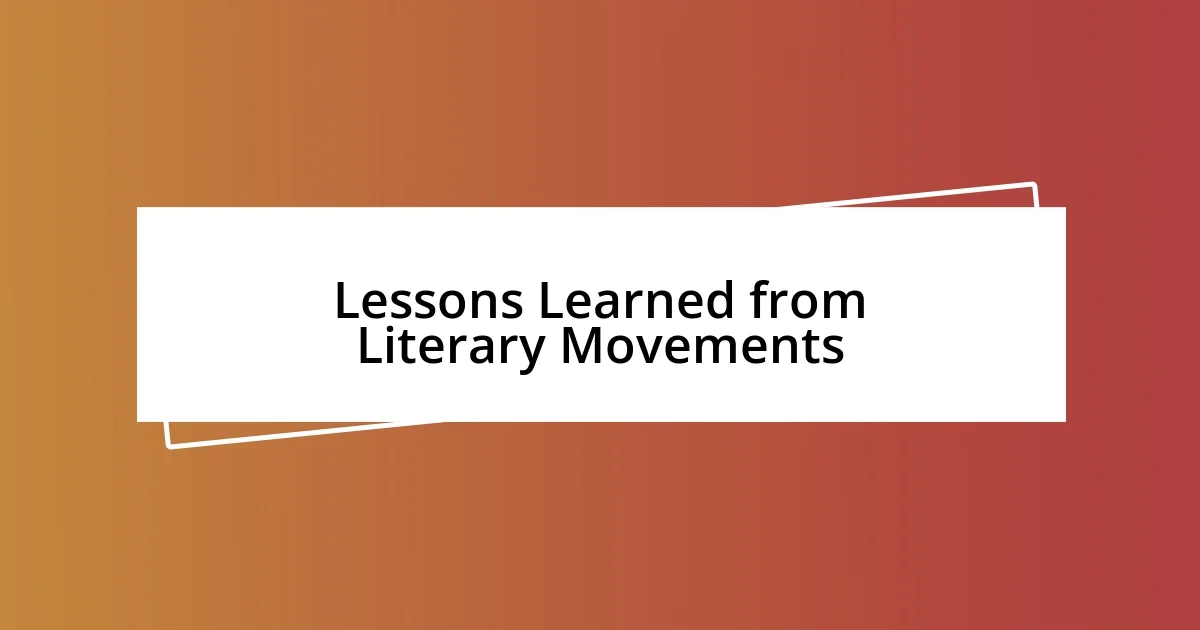
Lessons Learned from Literary Movements
Literary movements teach us that creativity often arises from the most challenging circumstances. For instance, the Dadaists responded to the chaos of World War I with art that defied convention. When I first encountered their playful yet poignant works, I realized how art and literature can serve as powerful forms of protest and resilience. How remarkable is it that in times of turmoil, people can channel their pain and confusion into art that inspires change?
One lesson I hold dear is the importance of cultural context in shaping literature. The feminist literary movement, for example, opened my eyes to the ways societal norms affect storytelling. I remember discussing The Bell Jar by Sylvia Plath in a book club and feeling a wave of recognition as we unpacked its themes of identity and oppression. It made me question how many stories remain untold because they don’t align with prevailing narratives, underscoring literature’s role in amplifying diverse voices.
I often think about how postmodernism redefines our understanding of truth and narrative. When I read works like Slaughterhouse-Five by Kurt Vonnegut, I was captivated by the disjointed timeline and the way it mirrors the fragmented nature of memory. This made me reflect on my own experiences and how our perceptions of reality can shift over time. Have you ever noticed how the stories we tell ourselves can change based on our understanding? It’s a mesmerizing testament to the interplay between literature and life.

